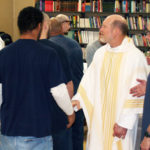By Corrine Winter
The Catholic Church has a strong tradition of “social teaching,” that is, of addressing issues of justice in society from the perspective of Catholic theological convictions. In many cases, the issues are addressed as well by groups outside the Catholic Church; the church welcomes the opportunity for dialogue and cooperation. It is the grounding in our faith commitment that the church and its representatives bring to the table in a unique way. That is true of Pope Francis’ recent encyclical, Laudato Si.

In the letter, the pope addresses issues of economic, social and environmental justice, calling for a response based on both human responsibility and Catholic faith. In chapter two, he explains the theological basis for his approach. Themes include creation as a divine gift through which we may come to know God, the relationship of humanity to God and to all of creation, and the hope that calls us to work on in the face of discouragement.
Creation as God’s gift comes into Christian theology from its Jewish roots as found in the Old Testament. Both of the creation accounts in Genesis show God as the source of all being. God creates out of God’s own goodness, and not because of any outside force or out of anything that existed before God. Further, the goodness of the world is affirmed against the kind of dualism that would attribute material aspects of creation to an evil force.
The psalms and Wisdom literature further portray creation as joining in the praise of God the creator and calling humans to an attitude of awe and wonder at God’s power and goodness. Early Christian theologians continued to insist on creation as the good work of God alone in opposition to on-going temptations to dualism and to pantheism, the idea that elements of nature are, themselves, divine. They affirmed that God created all things ex nihilo (out of nothing).
The theme of creation as showing forth the greatness of God sometimes received less theological attention, although it remained within the prayer tradition of the church. Pope Francis begins his encyclical by citing his chosen patron St. Francis of Assisi, who in the 13th century called the created brothers and sisters of humanity to join in praise.
Bonaventure, the successor of St. Francis as head of the Franciscan order, writes of a soul’s journey to God in which early steps include the recognition of God’s greatness through contemplation of the wonders of creation. The Vatican II document on Revelation (Dei Verbum) retrieved that theme powerfully, saying that God “provides constant evidence of himself in created realities (n. 3).”
In the sixth chapter of Laudato Si, Pope Francis asserts that recognizing creation as God’s gift calls us to an attitude of generosity (n 220), as well as to contemplation of God. Each creature, he insists, in the introduction to the encyclical, has value in and of itself and not merely as a resource for human living (n. 33), and while humanity has a unique role within creation, any idea that as “lords and masters” we have a right to exploit the natural world in the name of “progress” is opposed to our right relationship with God.
Pope Francis declares that humanity lives in three fundamental and intertwined relationships — with God, with one another and with the earth (n. 66). Here, too, we find echoes of St. Francis of Assisi’s well-known canticle.
The pope goes on to explore another theme found in Christian tradition — in a particular way in the theology of St. Irenaeus of Lyons (late 2nd century) and supported by the work of Thomas Aquinas. Irenaeus saw all of creation as both coming forth from God and destined for God.
The pope, too, insists that all of creation is called to ultimate union with God. He describes the created world as a “sacrament of creation (n. 9) making known the Triune God: Father as ultimate source, Son through whom all is created, and the Holy Spirit present to every creature and at the heart of the universe (n. 236). Breaking our relationships is sin; through Christ, we are offered a way of redemption, of restoring our relationships.
Thus, as Christians, we are called to believe that healing and right relationship are possible. Pope Francis’ approach is anything but naively optimistic. One need only read his description of the current situation in chapter one. But he is idealistic, insisting that the Spirit is at work in the world and among us. We need to pay attention and not be led astray by what he, echoing Pope Paul VI and every pope since, calls the “myth of progress.” He reminds us that, because as Catholics, we believe in the potential of human reason to recognize truth, we must enter into dialogue with all who search for ways for humanity to treat the earth as we ought.
At the same time, as Catholics, we ought to be upheld by the resources of our faith. I especially appreciate the pope’s description of the Eucharist. Reflecting the work of Pope Benedict XVI, he states that in the Eucharist, “the whole cosmos gives thanks to God,” and “creation is projected toward divinization (n. 236).”
(Corinne Winter is a professor of theology at St. Ambrose University, Davenport.)











